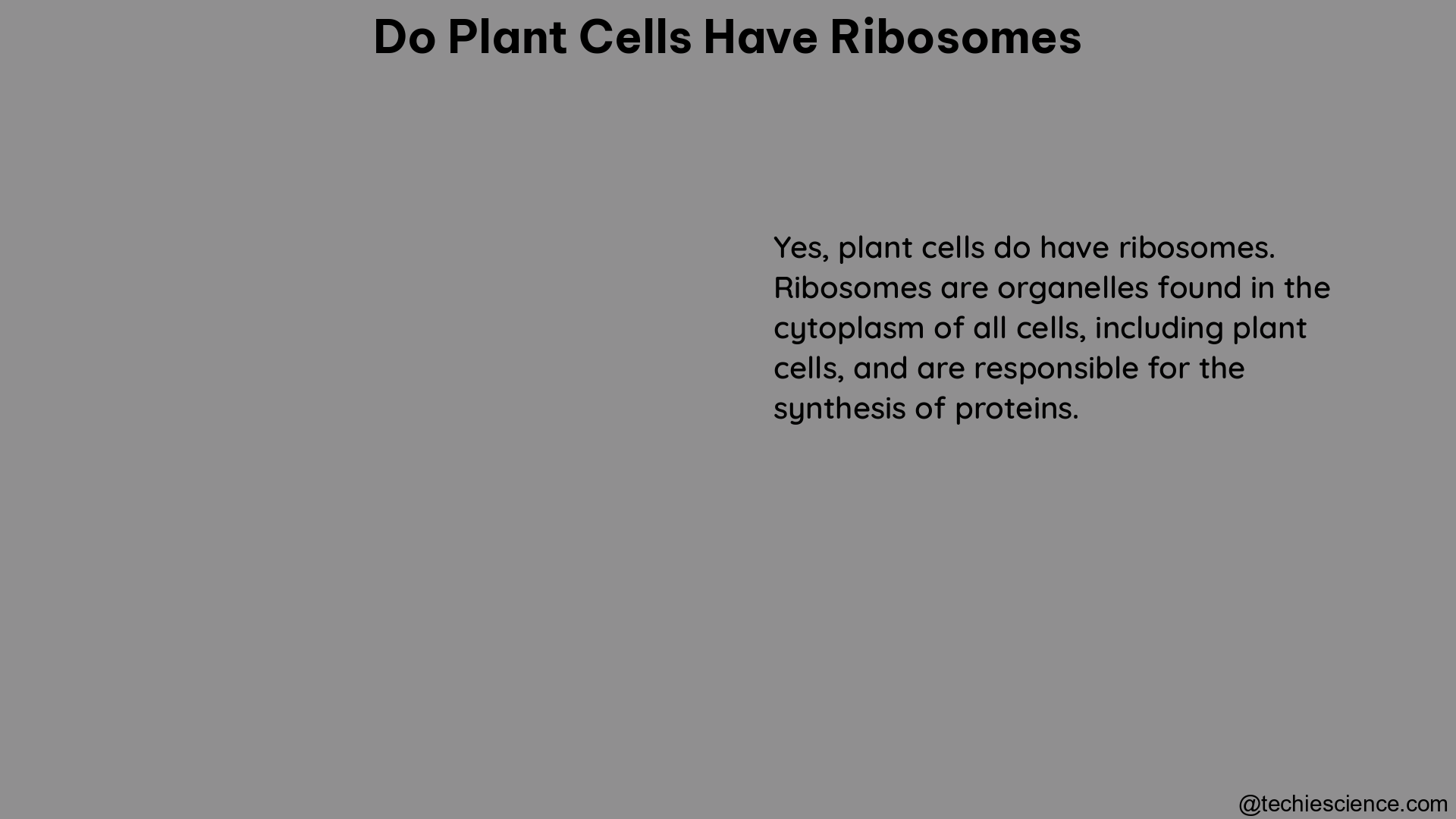Plant cells, like all eukaryotic cells, possess a remarkable organelle called the ribosome. Ribosomes are the cellular factories responsible for the synthesis of proteins, the fundamental building blocks of life. In this comprehensive guide, we will delve into the intricate details of ribosomes in plant cells, exploring their structure, function, and the critical role they play in the overall cellular processes.
The Presence and Importance of Ribosomes in Plant Cells
Plant cells are known to have a high demand for ribosomes, as they are essential for the synthesis of proteins required for various cellular functions, such as photosynthesis, cell division, and metabolic processes. Ribosomes are found in the cytoplasm, chloroplasts, and mitochondria of plant cells, underscoring their ubiquitous presence and importance.
Ribosome Structure and Composition in Plant Cells
Ribosomes in plant cells are larger than their prokaryotic counterparts, measuring approximately 20-30 nm in diameter. They have a sedimentation coefficient of 80S, with the large subunit having a sedimentation coefficient of 60S and the small subunit having a sedimentation coefficient of 40S. The molecular weight of ribosomes in plant cells is approximately 4.2 MDa.
The ribosomes in plant cells are composed of ribosomal RNA (rRNA) and proteins. A study published in the Journal of Proteome Research in 2018 identified a total of 79 ribosomal proteins in Arabidopsis thaliana, including 33 small subunit proteins and 46 large subunit proteins. This diversity in ribosomal proteins suggests the presence of specialized ribosomes that can regulate mRNA translation and control protein synthesis in response to various environmental and developmental cues.
Ribosome Biogenesis in Plant Cells
The biogenesis of ribosomes in plant cells is a complex and highly regulated process that involves the coordinated synthesis and assembly of rRNA and ribosomal proteins. This process takes place in the nucleolus, a specialized sub-compartment within the nucleus, and is essential for the proper functioning of plant cells.
The biogenesis of ribosomes in plant cells involves the following key steps:
- Transcription of rRNA genes: The rRNA genes are transcribed by RNA polymerase I to produce the precursor rRNA molecules.
- Processing and modification of rRNA: The precursor rRNA molecules undergo various processing and modification steps, such as cleavage, methylation, and pseudouridylation, to generate the mature rRNA species.
- Ribosomal protein synthesis: The ribosomal proteins are synthesized in the cytoplasm and then transported to the nucleolus for assembly.
- Assembly of ribosomal subunits: The mature rRNA molecules and ribosomal proteins are assembled into the large (60S) and small (40S) ribosomal subunits.
- Nuclear export and cytoplasmic maturation: The ribosomal subunits are exported from the nucleus to the cytoplasm, where they undergo final maturation steps before becoming functional ribosomes.
The regulation of ribosome biogenesis in plant cells is a crucial aspect, as it ensures the proper production and allocation of ribosomes to meet the varying demands of different cell types and growth conditions.
Functional Roles of Ribosomes in Plant Cells

Ribosomes in plant cells play a vital role in the synthesis of proteins required for various cellular processes. These processes include, but are not limited to:
-
Photosynthesis: Ribosomes are responsible for the synthesis of proteins involved in the light-dependent and light-independent reactions of photosynthesis, such as the components of the photosynthetic apparatus and the enzymes of the Calvin cycle.
-
Cell Division and Growth: Ribosomes are essential for the synthesis of proteins required for cell division, cell wall formation, and cell expansion, which are crucial for plant growth and development.
-
Metabolism: Ribosomes are involved in the synthesis of enzymes and other proteins required for various metabolic pathways, including the biosynthesis of carbohydrates, lipids, and secondary metabolites.
-
Stress Response: Ribosomes play a role in the synthesis of proteins involved in the plant’s response to biotic and abiotic stresses, such as drought, temperature extremes, and pathogen attack.
-
Signaling and Regulation: Ribosomes are involved in the synthesis of proteins that are part of signaling cascades and regulatory networks, which are essential for the coordination of various cellular processes.
The number and distribution of ribosomes within plant cells can vary depending on the cell type, growth stage, and environmental conditions. For example, actively growing and dividing cells, such as meristematic cells, typically have a higher ribosome content to support the increased demand for protein synthesis. In contrast, mature, non-dividing cells may have a lower ribosome content, as their protein synthesis requirements are generally lower.
Regulation of Ribosome Biogenesis and Function in Plant Cells
The biogenesis and function of ribosomes in plant cells are tightly regulated to ensure the proper allocation and utilization of these essential organelles. This regulation involves various mechanisms, including:
-
Transcriptional Control: The expression of genes encoding ribosomal proteins and rRNA is regulated at the transcriptional level, with various transcription factors and epigenetic mechanisms playing a role in this process.
-
Post-transcriptional Regulation: The processing, modification, and assembly of ribosomal components are subject to post-transcriptional regulation, involving factors such as RNA-binding proteins and small RNAs.
-
Translational Control: The translation of ribosomal proteins is regulated to ensure the balanced production of the different ribosomal subunits, preventing imbalances that could lead to cellular dysfunction.
-
Spatial and Temporal Regulation: The localization and distribution of ribosomes within plant cells are regulated to meet the specific protein synthesis requirements of different cellular compartments and developmental stages.
-
Stress Response Mechanisms: Plant cells can modulate ribosome biogenesis and function in response to various environmental stresses, such as nutrient deprivation, temperature extremes, and pathogen attack, to adapt to changing conditions.
Understanding the regulation of ribosome biogenesis and function in plant cells is an active area of research, as it provides insights into the complex mechanisms that underlie plant growth, development, and stress responses.
Conclusion
In summary, plant cells do indeed possess ribosomes, which are essential organelles responsible for the synthesis of proteins required for various cellular processes. Ribosomes in plant cells are larger and more complex than their prokaryotic counterparts, with a diverse array of ribosomal proteins that suggest the presence of specialized ribosomes. The biogenesis and function of ribosomes in plant cells are tightly regulated to ensure the proper allocation and utilization of these essential organelles, contributing to the overall growth, development, and stress response of plants.
References:
- Ribosome biogenesis in plants: https://www.ncbi.nlm.nih.gov/pmc/articles/PMC7332886/
- Ribosomes in plant cells: structure, function, and regulation: https://www.sciencedirect.com/science/article/pii/S1360138516302634
- Ribosome profiling reveals the rhythm of translation in Arabidopsis thaliana: https://www.nature.com/articles/nature14323

Hello, I am Sugaprabha Prasath, a Postgraduate in the field of Microbiology. I am an active member of the Indian association of applied microbiology (IAAM). I have research experience in preclinical (Zebrafish), bacterial enzymology, and nanotechnology. I have published 2 research articles in an International journal and a few more are yet to be published, 2 sequences were submitted to NCBI-GENBANK. I am good at clearly explaining the concepts in biology at both basic and advanced levels. My area of specialization is biotechnology, microbiology, enzymology, molecular biology, and pharmacovigilance. Apart from academics, I love gardening and being with plants and animals.
My LinkedIn profile-